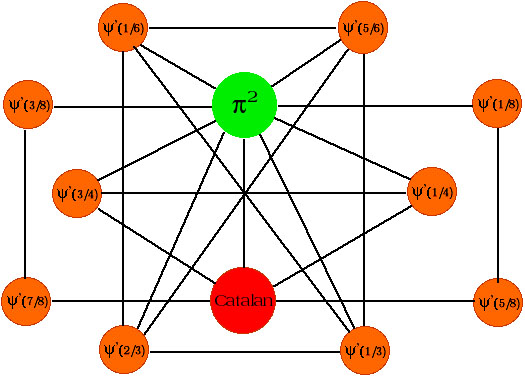-
-
- A few identities with Catalan constant
and Pi^2
- by Simon Plouffe
- November 29, 1999
-
- This simple graph represents many of the
integer relations with those constants without taking into account
the coefficients.
- The coefficients can be detected easily with
any of the implementation of the LLL or Integer Relation
algorithms that exist in many computer algebra programs like
Mathematica, Maple or with PSLQ [1]. In this case the
coefficients could also be deduced from the numerous functional
equations that are known [2].
- For example 8*Catalan +Pi^2 - Psi(1,1/4) =0,
which is represented by a closed circuit, each closed circuit is
an identity (equal to 0). Another example is 16*Pi^2 -
15*Psi(1,2/3) - 3*Psi(1,1/6) = 0. Here Psi(1,x) is the first
derivative of the logarithmic derivative of the Gamma function.
Another way of saying it : it all comes back to the Gamma function
with rational arguments. Of course, this graph does not represent
all possible relations with Pi^2, if we add Pi^2 * sqrt(2) the
graph gets much more complex. You may consult this
computer
output for the exact coefficient but I
find this graph much easier to read.
-
-

-
- A few remarks.
-
- There are no known single expression for a
number like Psi(1,1/3) alone in terms of Pi^2 and Catalan
constant.
-
- The identities are symmetric, which comes from
the formula Psi(1,x) + Psi(1,1-x) = Pi^2 /
sin(Pi*x)^2.
-
- Not all the representations of 0 are there, I
removed the ones that appear without Pi^2 or Catalan like
Psi(1,3/8), Psi(1,7/8) and Psi(1,3/4). There should be with a
circuit but since it represents 0 it has to be removed to avoid a
false relation with Psi(1,7/8), Psi(1,3/4) and Catalan. The
good one is in fact with Psi(1,3/4), Catalan and
Pi^2.
-
- [1] David H. Bailey; Plouffe,
Simon, Recognizing
numerical constants. Organic
mathematics (Burnaby, BC, 1995), 73--88, CMS Conf. Proc., 20,
Amer. Math. Soc., Providence, RI, 1997. (Reviewer: Samuel S.
Wagstaff, Jr.)
-
- [2] L.
Lewin, Polylogarithms and Associated Functions, North Holland, New
York, 1981. The color of that book is bright orange.
-

